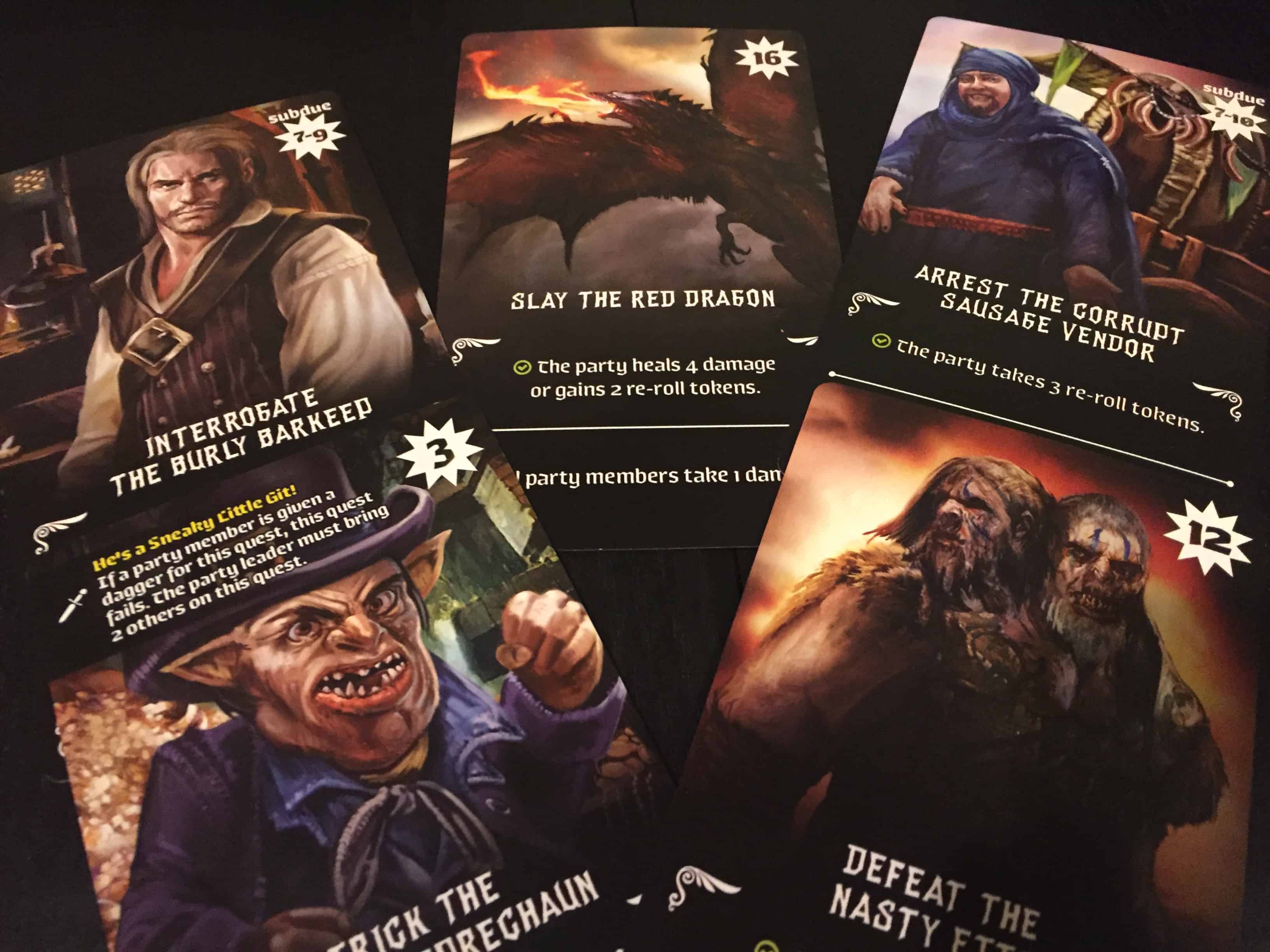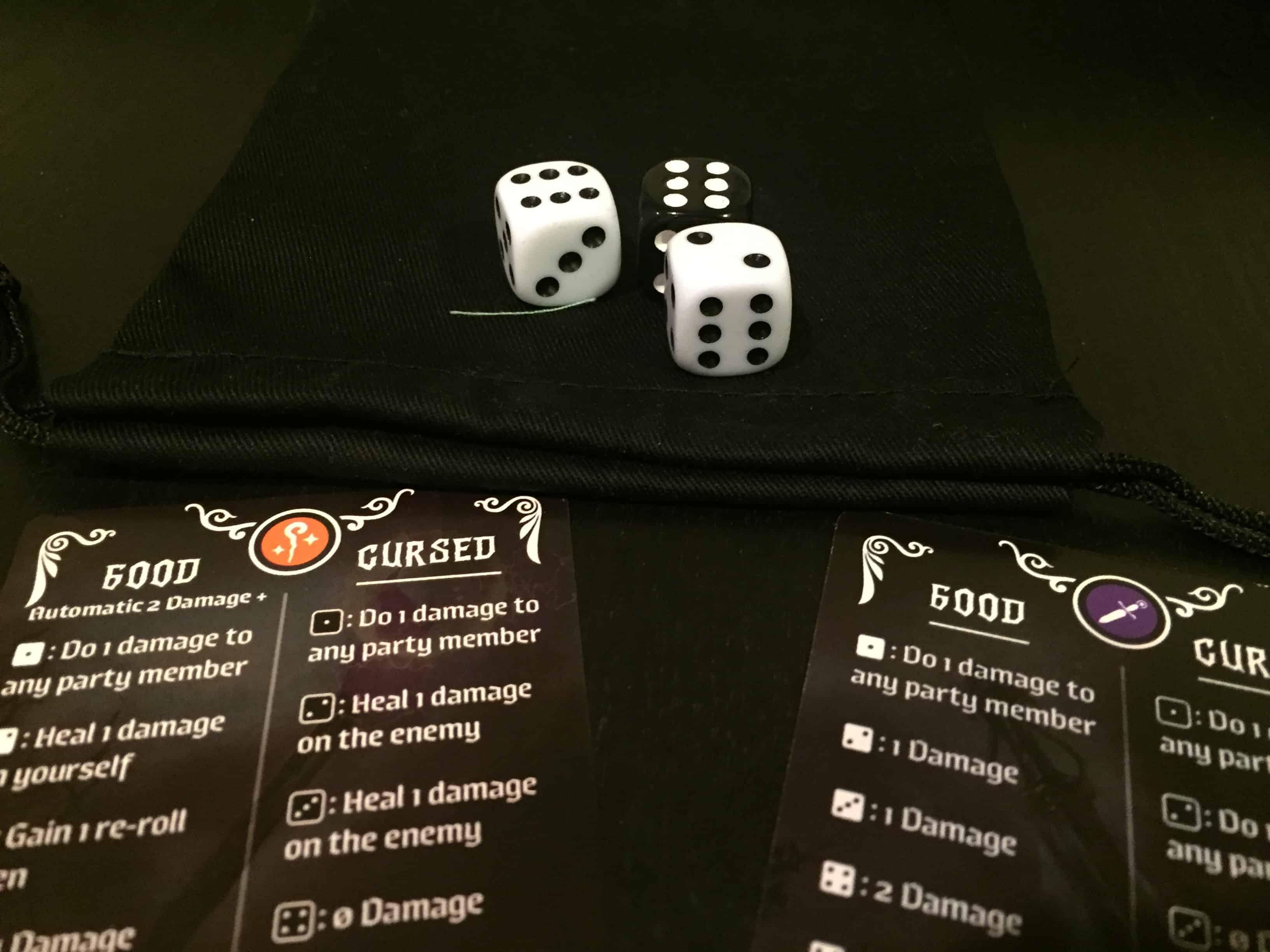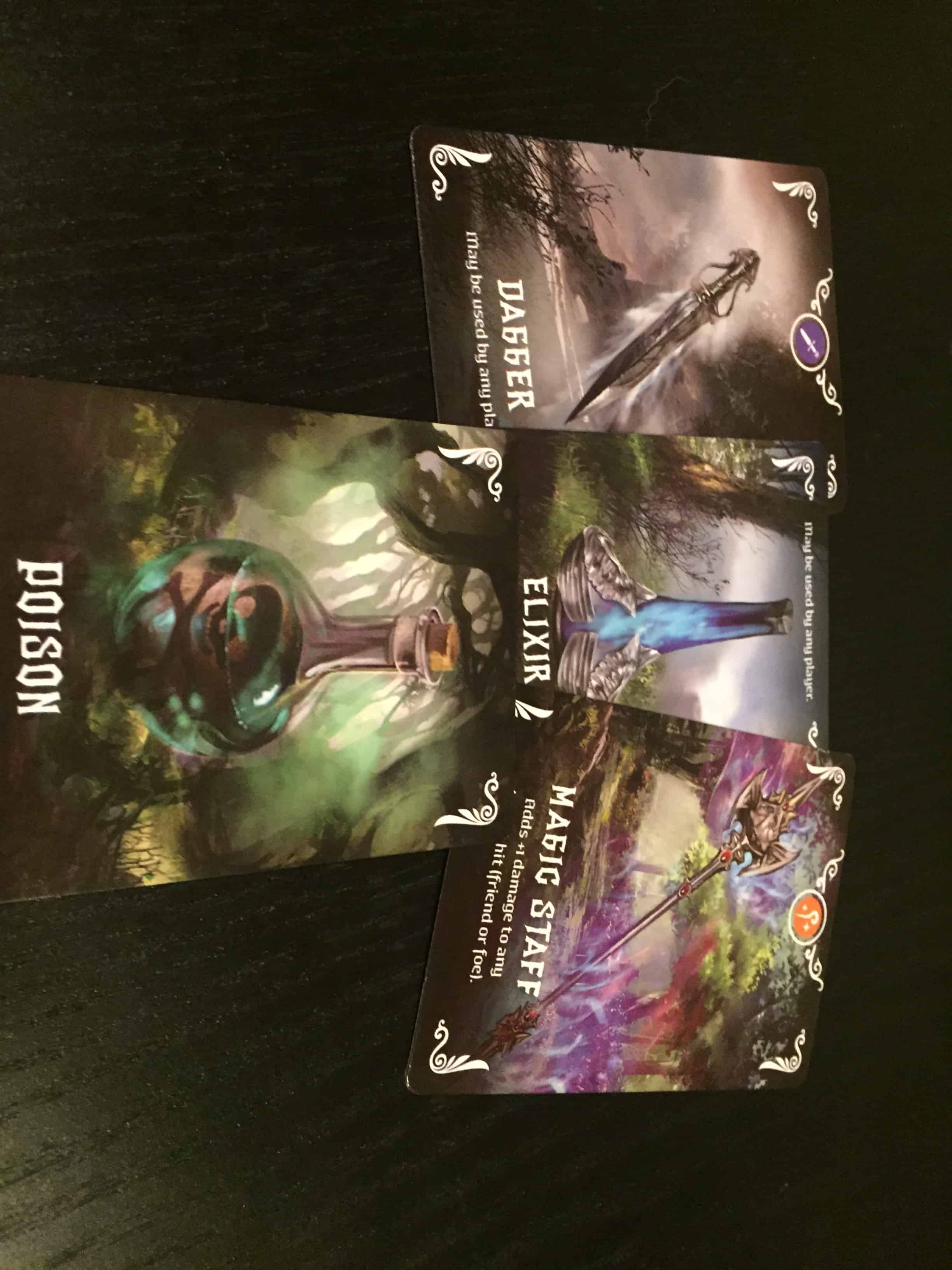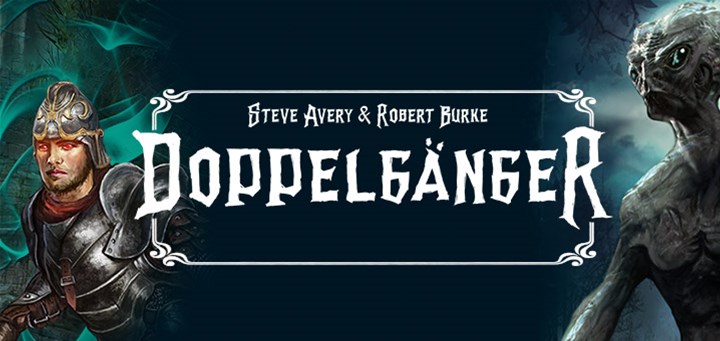Are you in one of those playgroups that manages to sneak in a game (or three) of Resistance, or Avalon, during every game night? Or, if a particular game night swells to 8 available players, is one of those two games the immediate crowd pleaser? If you are a bit tired of all that but want to stay solidly in the realm of social deduction, Doppelganger is here for you. It takes many of the same mechanisms and adds many more wrinkles to spice up gameplay.
Doppelganger certainly offers more than its social deduction antecedents. But is it better?
How to Play Doppelganger

In Doppelganger, players play the roles of adventures – warriors, rogues, and wizards, mostly – that must work cooperatively to overcome a series of quests. Sometimes you will need to slay a dragon, subdue a robber, or negotiate with a leprechaun, or overcome other, similar perils. However, one or more traitors (called “doppelgangers”) lurk within the group, trying to bring about ruin for the party.
Each round follows a series of steps, each of which affords the Doppelganger an opportunity to cause mischief.
1) Selecting the party: The party leader for the round chooses who will go adventuring with the party. Unlike The Resistance, the party can be as big or as small as the party leader wants. If a party member went on a previous quest, they are “exhausted’ and take damage at the end of it. This mechanic encourages party leaders to take different people on the quest every time.
Many quests call on the heroes to kill a monster, which is simple enough because overkill isn’t a problem. However, some quests are to “subdue” a subject, which means that the party has to do the exact right amount of damage to a foe. That requires the party leader to select the group a lot more carefully.
The Doppelganger, of course, can lie his or her way on to the party. Or, they can simply lay back, allow others to get exhausted, and try to hop on the active party when a quest with a nasty fail condition comes out.

2) Gearing Up: All players on an active quest contribute an item card from their hand into a common pool. The party leader then draws two more cards from the deck, shuffles, discards one item without looking, and then gives out the rest of the items. Ideally, the party leader will give appropriate items to each person – the wizard gets a staff, the warrior gets a sword, etc.
At this point, if the Doppleganger was chosen for the quest, he or she can contribute an item to hurt the party – a bow that no one can use, or poison that will bring an immediate end to the whole expedition. They can then blame another person, or the random card draw, which gives them a lot of room to find cover for their shenanigans.
3) Resolving Attacks: After everyone has their gear, each person executes their action to the best of their ability. If a character has the proper weapon, they pull from a die from a bag and roll damage. The basic bag has two black dice (cursed dice) and one white. The player draws two secretly, selects one and rolls it. The white die deliveres generally good results, while the black die has around a 50% chance to injure the party instead of the enemy.
Once again, the Doppleganger has some wiggle room to play dumb. They can purposely return a white die and roll the black, claiming they pulled two black dice and had no choice. Or, they can choose and roll the white early to build trust and strike later.

4) Assigning Damage: Damage in Doppleganger comes in the form of red cubes. If a quest fails and the party takes damage, the party leader will acquire as many cubes as damage dealt (i.e., if a creature does 4 damage, they will grab four cubes). They will then assign one cube of damage to whoever they like, then give the rest to another party member who will do the same. The rulebook calls this a “damage ping pong”, where different people get a chance to assign damage.
The Doppleganger doesn’t have a lot of room to hide here. However, assigning damage in this way can become a really satisfying way to finish someone off. If the Doppleganger gets their hands on the cubes when someone is one HP away from death, they can assign that damage in a very direct and satisfying way.
If you succeed a mission in Doppleganger, you flip a tile from a group of six tiles labeled “win”. If you reveal three artifact tiles, the good guys win. However, if you fail, then you flip a tile from a similar pile labeled “lose”. Flipping three cursed artifacts results in a Doppleganger win.
The party can also win if the Doppleganger dies. Conversely, the Doppleganger wins if another party member dies.
What I Liked About Doppleganger
1) The traitors have LOTS of chances to be sneaky
In a lot of simpler social deduction games with hidden traitors, the onus is on the player to read the group and exercise the right amount of deception in order to accomplish their goals. Assert yourself too much, and the group might sniff you out too early. Let things play out, and the game might get away from you and leave you without a chance to be effective.
In Doppelganger, however, the mechanisms provide a lot of cover for the traitorous player. A party might do everything right, take all the right people who contribute all of the right stuff to a quest, and still fail due to RNG of the deck, the dice pull, or the dice roll. When this happens, it creates a wonderful atmosphere of distrust for the Doppleganger to manipulate.
As someone who enjoys the occasional social deduction game but does not play them all of the time, I really enjoyed how many levers I had at my disposal, rather than just relying on my (poor) lying abilities. I feel that, even though Doppelganger is clearly more complex than similar, more popular games in the genre, this game gives more access to more folks who want to play traitor games, but don’t feel they would be very good at them.

2) Unique quests and other mechanisms added a lot of flavor
As I mentioned in the description, the quests can vary from killing everything to being required to do a precise amount of damage, to barely doing any damage at all. I loved that. It challenged the players at the table to pay attention to what was going on and to adjust their “pitch” to the party leader accordingly.
In addition, the different quests as well as the items and dice rolling gave Doppelganger the feeling of an old school RPG. Sometimes, despite your best preparation, RNG might work against you. The game gives you tools to mitigate, such as character powers and rerolls, but ultimately leaves you to your fate.
All told, I thought Doppelganger successfully recreated a good adventuring party atmosphere.
What I Didn’t Like About Doppleganger
1) A bit too heavy on mechanisms?
I’ve spoken about all of the mechanical layers of Doppelganger in a positive light thus far. However, I can see some veteran social deduction players having a more negative reaction. While I pointed out all of the tools available to a Doppleganger player, they can just as easily work against you. You might roll your curse die and get a result that benefits the party, or throw in your negative card and have the party leader randomly throw it away. None of these are unintended; rather, they are core to the intended game experience.
2) More rules can lead to more opportunity for lack of clarity.
Our group found more than one occasions where we got tripped up by the rules. The written rules are fine, but a bit light on detail. For example, if a monster deals damage to the party, does it mean the active party or everyone at the table, whether they went on the quest or not? We intuited the former, but it wasn’t clearly stated in the rules.
We didn’t encounter any lack of clarity that broke the game. However, we felt it was just enough to worth noting.
Conclusion
I would hesitate to recommend Doppelganger as an initial foray into social deduction gaming. There’s a fair amount going on. It definitely took me longer to teach the game and to answer people’s questions than if I were teaching The Resistance, Coup, or another classic in the genre.
However, if you get past that bit of a barrier, I found Doppelganger to be a really satisfying experience. The mechanisms all come together to create great atmosphere and tension, giving the traitor player a lot of tools to cause mischief.
Final Verdict (Scale of Burn, Dodge, Play, or Buy): Play, possible Buy for fans of social deduction.





Show Comments